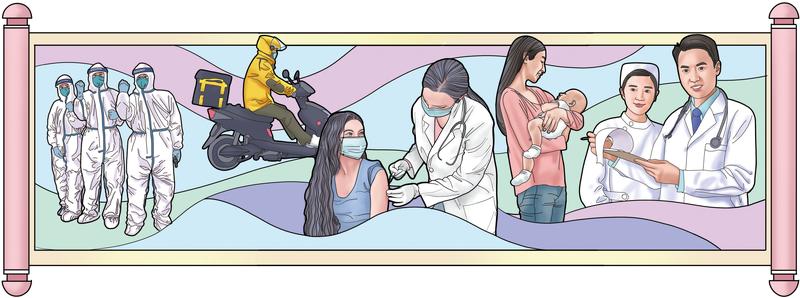 (JIN DING / CHINA DAILY)
(JIN DING / CHINA DAILY)
This is a critical moment in the pandemic situation in China. The Chinese government and people have sacrificed a lot over the past three years to make what I see as a truly remarkable achievement, by adhering to the dynamic clearing pandemic policy which as the general public discusses it is often referred to as the country's "zero covid" policy. An estimated 5 million deaths have been prevented by the combination of the government's public health policy and the people's strong support, sacrifice and civic duty.
Few observers who criticize China's anti-pandemic policy mention that the deep societal values driving the country's approach are based on traditional family values including filial piety and respect for the elderly. In such a society, it is only natural that protecting family members' health is the top priority.
China has done well to safeguard the lives and health of its people over the past three years, and has rightly lifted the restrictions now so that it can also help protect their livelihoods and promote economic development
China has reached another critical crossroad in its fight against COVID-19 after deciding to ease the strict anti-pandemic policy, lifting many of the restrictions on people's movement. Hence, it is important to consider the path forward into the future at this extraordinary time.
Earlier this year, both Hong Kong and Taiwan witnessed large outbreaks resulting in unacceptably high death rates. In contrast, the Chinese mainland managed to keep the death rate very low despite the massive outbreak in Shanghai along with rising infections in Guangzhou, Beijing and Chongqing in the weeks that followed. And the success in keeping the death rate low prompted the mainland to ease many of the COVID-19 restrictions by issuing a new 20-point policy on Nov 11.
Such an important decision obviously raises certain questions: Whether the easing of restrictions has led to chaos? Is this the right time to open up?
The turn of events since the cancellation of mandatory nucleic acid testing and health kit mini-program tracking has come as a surprise. Within two weeks of the decision, the highly contagious sub-variant of Omicron has swept across many cities much faster than many expected including Shenyang, where I live. Most of my friends, including those on large social WeChat groups, have contracted the virus. So have many other people. City streets became deserted, because the people, out of their own accord, were reluctant to venture outdoors.
The good news is that as of 10 days later, as I write this article, we are on the road to recovery. Also, the final vaccination drive for the elderly is in full gear. That will help to safeguard the senior citizens against the novel coronavirus.
I was also happy to once again see photographs of crowded Beijing subway stations. It indicates the situation is fast returning to normal in the capital — and soon in other cities we will witness similar scenes.
If infections surge all of a sudden in a city or country, hospitals are bound to be overcrowded. That's exactly what has happened in some Chinese cities. But the mildness of the virus overall means the death rate will remain relatively low.
That brings us to the issue of economic development. Since many people have been infected and recovered, the fear of COVID-19 being lethal has been greatly allayed, and people are enthusiastically returning to work, which bodes well for the economy.
The lifting of restrictions and the subsequent, inevitable rise in infections are likely to be portrayed by Western observers to the world in one of two ways: as fearmongering of an impending disaster to demonize the Chinese government; or as a pragmatic decision based on proper analysis as the government confirmed the vast majority of cases include mild enough symptoms.
There are too many dark forces behind the geopolitical games being played by the major powers. They will never acknowledge China's achievements nor view China with the right perspective. But the Chinese government should pay greater attention to preventing serious cases, in order to strike the right balance between anti-pandemic measures and economic development.
All humans face the specter of illness and disease, of burden and loss. China has done well to safeguard the lives and health of its people over the past three years, and has rightly lifted the restrictions now so that it can also help protect their livelihoods and promote economic development. And it will succeed in its endeavor, not least because of the support of the Chinese people.
The author is an American writer living in China and a non-resident senior fellow at the Center for China and Globalization.
The views don't necessarily reflect those of China Daily.


